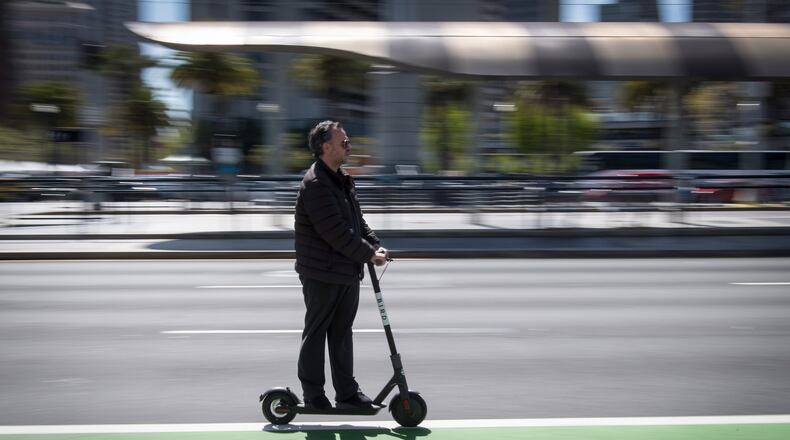Atlanta could be the most innovative city in America in solving the last mile problem – how people travel from public transport stations to final destinations.
This is the most important commuter issue affecting decisions to use public transport services rather than private cars. Solving it will improve our quality of life, and benefit disproportionately lower income and non-car citizens who want cheap and convenient ways to get around. The last mile is the true challenge.
Getting there requires wise and long-range governance. The Atlanta City Council took a step in the wrong direction in January by adopting well-intended, but badly designed regulations on dockless devices. Its action reduces robust innovation in finding the right solutions for Atlanta.
One concern is safety – four deaths are associated with e-scooters as of last week. And the City Council is getting an earful of complaints from irritated folks:
- Electric scooters are left at the convenience of users, and picked up by companies. Result: scooters are abandoned everywhere.
- Users are urged by Bird to wear helmets and be at least 18 years old. Both rules are widely ignored.
- Pedestrians feel threatened as scooters pass at up to 15 mph.
Does this mean we should ban e-scooters? No. New technologies are inherently irritating because they work within physical and legal environments built for other uses. Cars in 1910, for example, scared horses and farm animals, and created clouds of dust on dirt roads built for carts. Many cities in America wanted to ban or restrict the car to allow mules and carts to work unhindered.
It is impossible to avoid irritation by building the right infrastructure in advance because we not yet know what mix of technologies will win the day. That is why new technologies are so irritating – Ford tried to fit into a “horse and cart” infrastructure, just as dockless devices are trying to fit into a car and bicycle infrastructure.
In responding too quickly to irritants, the Atlanta City Council made classical anti-innovation mistakes: it created new barriers to entry with a license that has no clear purpose but discourages competing services; and it imposed arbitrary fees unrelated to public cost, but that boost user prices and increase capital barriers for new services. Atlanta is already wielding the license to impose arbitrary limits on consumer use: In a city of half a million, Atlanta permits 9 companies to use only 12,700 devices, and is considering more limits on vendors. Such heavy-handed rules reduce investment and innovation.
Slowing down innovation protects yesterday’s technologies because new technologies will not mature without experimenting in the market. The best approach for Atlanta is to let experimentation continue, while imposing light-handed regulation on the most serious problems as they emerge. Even steps in that direction are erratic. The Council has banned e-scooter use after 9 p.m, but oddly did not mandate helmets, the most important safety issue.
Lessons are clear: When beneficial innovation is underway, monitor and wait until clear risks emerge before stepping in. Let innovation mature. Don’t move too quickly – government must be patient, endure the complaints, and have the self-restraint to focus on long-term benefits.
For example, Presidents Obama and Trump agree that the federal government should not move too quickly to regulate self-driving cars, given potential safety benefits. Federal regulators are clear: “The right approach to achieving safety improvements begins with a focus on removing unnecessary barriers and issuing voluntary guidance, rather than regulations that could stifle innovation.”
The Atlanta council defends its actions as moderate, based on a review of other American cities, several of which (such as Athens) have exhibited extreme over-reaction to the irritants.
Atlanta could be a leader by reviewing its policies to remove barriers to innovators in providing last-mile solutions, not adding more. It could ask vendors to address the problem of pickup, and regulate the highest-risk problem: helmet use. It could look ahead to the kinds of infrastructure needed for a variety of last-mile solutions.
Most important, it should keep a clear view of the huge long-term benefits to Atlanta’s citizens of solving the last mile, and practice that rarest of disciplines of politicians: self-restraint.
Scott Jacobs is the former head of the OECD’s Regulatory Reform Program and a global consultant on smart regulation.
About the Author
Keep Reading
The Latest
Featured


